The Art of Reperformance: ownerBuilt and The Reveal
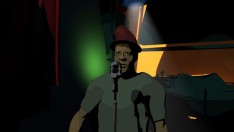
ownerBuilt, by Lawrence Andrews
Sunday April 26, 2015, 7:30 pm
Los Angeles Filmforum presents
The Art of Reperformance: ownerBuilt and The Reveal
At the Spielberg Theatre at the Egyptian, 6712 Hollywood Blvd., Los Angeles CA 90028
Lawrence Andrews in person!
An exciting set of explorations where the verisimilitude of image and audio is questioned and documentary and artistic practice converge. Lawrence Andrews’s ownerBuilt, making its Los Angeles premiere, is a remarkable work of animation and also apparently an animated documentary, but where the most common arbiter of “truth” in animated documentary, the recorded testimony, has been reperformed. Adie Russell’s The Reveal, also in its LA premiere, sees Russell visually performing Marlon Brando and Dick Cavett in Brando’s appearance on Cavett’s show, with the audio staying true to its source. Zora Neale Hurston’s recordings upset the normal conventions of ethnographic recording, where she plays the songs that she has learned from the local musicians. A set of works that may lead you to question your expectations of the picture-sound relationship, and, by extension, the presuppositions of power and authority. Artist Lawrence Andrews will be in town from the Bay Area to discuss.
“ownerBuilt firmly occupies and is concerned with the space around the margins of society. This work therefore imagines the various ways anonymity can function in that space, especially as it relates to the problems of visibility and the attainment of political power. Ultimately, as an aural performance reconfigured in cinematic space, ownerBuilt is envisioned as a Radical Sound Project, where the sound of the dog wags the tail of the picture, positioning sound as the privileged track and effectually dethroning image.” (Lawrence Andrews)
For more event information: www.lafilmforum.org, or 323-377-7238
Tickets: $10 general, $6 students/seniors; free for Filmforum members. Available by credit card in advance from Brown Paper Tickets at http://bpt.me/1433723 or at the door.
Lawrence Andrews is an Artist and is currently an Associate Professor of Film and Digital Media Arts University of California, Santa Cruz, CA. His work has shown extensively throughout the U.S. and internationally on cable television, in museums and galleries and major festivals including the Whitney Biennial, The New York Museum of Modern Art, The San Francisco Museum of Modern Art, Pacific Film Archive, and The American Film Institute. He has received various grants awards and fellowships in support of his work including a Rockefeller Inter cultural Documentary Fellowship, two National Endowment for the Arts Artist Fellowship. More at http://film.ucsc.edu/faculty/lawrence_andrews
Adie Russell is a multi-media artist working in photography, video, performance, drawing, and painting. She was raised in Europe and the United States and currently lives in Kingston, NY. She holds a BA/BFA from the Eugene Lang College/Parsons School of Art & Design both at The New School for Social Research. Russell has exhibited in the United States and Europe, most recently in an exhibition entitled “The Subterraneans” at the Leeds College of Arts in Leeds, UK in fall 2014. She has had solo shows at Leeds College of Art, where she first exhibited The Reveal, The Center for Photography at Woodstock, NY, Roos Arts, Rosendale NY and Melle Finelle, Boston, MA. She has participated in Artist Residencies at the University of Cape Town in South Africa, La Cipresssaia in Montagnana in Italy, at the Contemporary Artists Center in North Adams, MA, and Salem Art Works in Salem NY. More at http://www.adierussell.com/
Zora Neale Hurston, originally of Eatonville, Florida, was already a published novelist and folklorist when she took a job with the Federal Writers' Project in Florida.
Songs downloaded from the Library of Congress, http://www.loc.gov/folklife/guides/Hurston.html
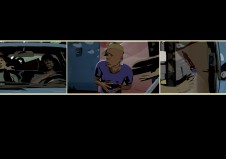
ownerBuilt by Lawrence Andrews
ownerBuilt
Lawrence Andrews (2013, digital, color, sound, 49 min.)
Los Angeles premiere!
ownerBuilt exists as an aural performance reconfigured into animated cinematic space.
Hurricane Katrina and the ensuing aftermath destroyed Noel’s community, neighborhood and home. But he is rebuilding, and as he rebuilds, he tries to evoke the memories of what was, through the enlistment of his personal archives. His memories are complicated by the tragic events that occurred on the Danziger Bridge on September 4th 2005. As Noel reflects back on what has been lost, the story that he tells about his neighborhood is affected by the story of innocent people attempting to cross a bridge in search of safe haven, and for Noel their plight clarifies the questions that arose in the aftermath of Katrina.
Noel's questions give rise to other questions, especially about the status of truth in what might seem to be a post-documentary age. Noel performs his story motivated by a collection of photographs that prompt him to recount events from his past and present. An implied author, in turn, performs Noel who performs others, who themselves are performing with varying degrees of self-consciousness. And in this manner a performative documentary comes into being. This concept of people filtered through and performed by an author are extensions into pre-existing forms like theatrical monologues and stand-up comedy, but these forms are usually not situated within a documentary tradition, or, when they are, the formal aspects of the medium are usually reduced to documenting a performance. Do degrees of theatricality dictate which boxes various texts are slated into and deemed authentic representations of the truth? Such questions are further complicated by an anti-theatrical prejudice. What is the source of this prejudice? What usefulness does it pose for us? And in what ways is its application problematic in a documentary context? Presenting the work in what may be deemed a theatrical form has the potential to de-legitimize and thwart its claims for documentary status, but this is a tension I hope the project explores.
OwnerBuilt is also constructed to compare archival approaches to presenting information against more structured narrative flows, so early parts of the performance present samples from Noel's archives with no attempt made to structure sequential meaning. This approach, while disorienting, creates a tension that can be explored experientially. By thwarting the desire to construct meaning out of implied causal connections, and then gradually facilitating this activity as the work progresses, I hope to provoke further questions: Is there more truth in an archival structure that doesn’t attempt to do this work for you? As listeners, do we want to do this work for ourselves, or do we prefer to delegate it to the author? (Lawrence Andrews)
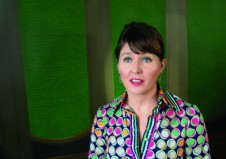
The Reveal, by Adie Russell
The Reveal
Adie Russell (2012, HD, color, sound, 20 min.)
In a 1973 televised interview with Marlon Brando, talk show host Dick Cavett asks “Why do you downgrade acting?” A charged interplay unfolds in which Brando, arguably America’s greatest actor, makes a case for acting as a survival mechanism, indicating the impossibility of honest human interaction in the entertainment arena and beyond. By revealing the artificiality of both the dialogue in which he’s engaged and the contrivance of social relations at large, he insists on a kind of authentic interchange, exposing the gulf between the role Cavett is playing and the private self behind that role.
In her video, The Reveal, Adie Russell recontextualizes this recording, replacing the original visual cues with an altered context, and replacing the protagonists’ acting with her own. She brings together temporal spaces: the historical moment of the audio recording and the moment inhabited by herself and the viewer in the present. The exchange between these moments exists as a composite of past and present, a kind of third space where meanings shift, judgments waver, visual cues are displaced, and the language hovers, unattached to the identity of the original speaker, and yet not quite attached to the identity of the performer.
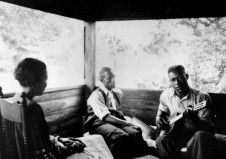
Gabriel Brown playing guitar as Rochelle French and Zora Neale Hurston listen (Florida Memory)
“Let’s Shake It”
Performed by Zora Neale Hurston (1939, audio only, 2:53)
A Negro track-lining chant, learned at a railroad camp in [Callahan?] (North Florida) in 1935.
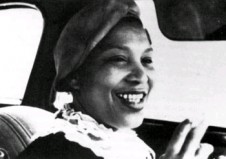
Zora Neale Hurston (Library of Congress)
“Shove It Over”
Performed by Zora Neale Hurston (1939, audio only, 2:47)
A lining rhythm generally distributed throughout Florida, learned from Charlie Jones on a railroad construction camp near Lakeland, Florida, in 1933.
“Uncle Bud”
Performed by Zora Neale Hurston (1939, audio only, 3:19)
A social song, for amusement, sung by men all over the South; a "jook song," it is not sung in front of respectable ladies.
“Mama Don't Want No Peas, No Rice”
Performed by Zora Neale Hurston (1939, audio only, 3:15)
A song from Nassau, the Bahama Islands, sung at jumping dances and fire dances. According to Zora Neale Hurston, "They're great songmakers, and their tunes are decidedly more African than the ones made by the Negroes in America. They make songs so rapidly, they say, 'Anything you do, we put you in sing,' and in a few hours they have a song about it. 'Mama Don't Want No Peas, No Rice' is about a woman that wanted to stay drunk all the time, and her husband is really complaining about it. He's explaining to the neighbors what's the matter with his wife and why they don't get along better."
